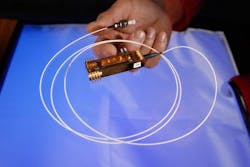Quantum-key distribution goes to market in LANL tech transfer agreement with Allied Minds
Los Alamos National Laboratory (LANL; Los Alamos, NM) has signed its largest information technology agreement ever; the agreement, with Whitewood Encryption Systems (Boston, MA; a wholly owned subsidiary of Allied Mind) provides exclusive licenses for several LANL-created quantum-encryption patents.
Quantum-key distribution for the masses
The agreement brings the potential for truly secure data encryption in the form of quantum-key distribution technology to the marketplace after nearly 20 years of development at LANL.
LANL's device uses the quantum properties of light to generate random numbers, quickly creating cryptographic keys to allow real-time encryption at high data rates. The Los Alamos technology is simple and compact enough that it could be made into a unit comparable to a computer thumb drive or compact data-card reader. Units could be manufactured at very low cost, putting them within easy retail range of ordinary electronics consumers.
The random-number-generation technology creates cryptographic keys based on the truly random polarization state of photons. Because the randomness of photon polarization is based on quantum mechanics, an adversary cannot predict the outcome of this random-number generator. This represents a vast improvement over current "random-number" generators that are not truly random, but instead are based on mathematical formulas that can be broken by a computer with sufficient speed and power.
Moreover, any attempt by a third party to eavesdrop on the secure communications between quantum-key holders disrupts the quantum system itself, so communication can be aborted and the snooper detected before any data is stolen.
"Quantum systems represent the best hope for truly secure data encryption because they store or transmit information in ways that are unbreakable by conventional cryptographic methods," says Duncan McBranch, Chief Technology Officer at Los Alamos National Laboratory.
"Whitewood aims to address one of the most difficult problems in securing modern communications: scalability—meeting the need for low-cost, low-latency, high-security systems that can effectively service increasingly complex data security needs," said John Serafini, Vice President at Allied Minds. "Whitewood's foundation in quantum mechanics makes it uniquely suited to satisfy demand for the encryption of data both at rest as well as in transit, and in the mass quantity and high-throughput requirements of today's digital environment."
Source: http://www.lanl.gov/discover/news-release-archive/2014/September/09-02-secure-computing.php

John Wallace | Senior Technical Editor (1998-2022)
John Wallace was with Laser Focus World for nearly 25 years, retiring in late June 2022. He obtained a bachelor's degree in mechanical engineering and physics at Rutgers University and a master's in optical engineering at the University of Rochester. Before becoming an editor, John worked as an engineer at RCA, Exxon, Eastman Kodak, and GCA Corporation.
